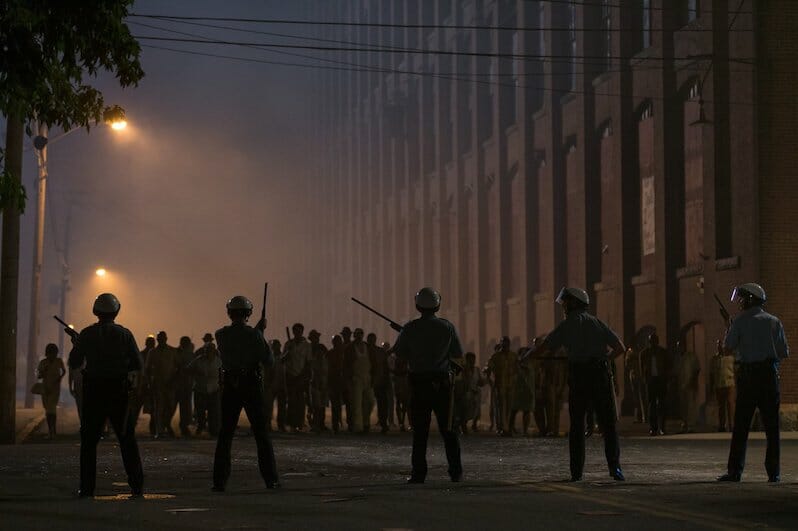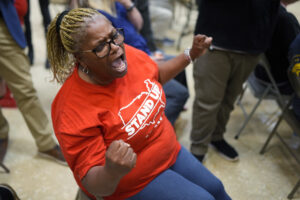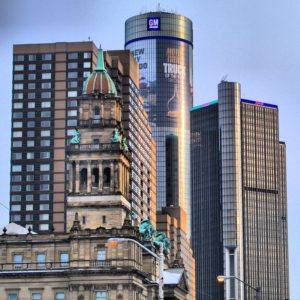‘Detroit’: It Looks Like Vietnam, but It’s the USA
Director Kathryn Bigelow turns the tragic events of July 1967 in Detroit into a tense suspense film. Detroit police officers face off with civilians in this still from Kathryn Bigelow's film "Detroit." (IMDb)
Detroit police officers face off with civilians in this still from Kathryn Bigelow's film "Detroit." (IMDb)
On a muggy July night almost exactly 50 years ago singer Larry Reed and his group, The Dramatics, were slated to follow Martha and the Vandellas onto the stage of Detroit’s fabled Fox Theater.
Because of the inferno outside, a civil disturbance that flared into one of the longest and deadliest riots in American history, authorities evacuated the Fox before The Dramatics could take the stage. Some of the group’s members made it home. Others, including Reed, took refuge at the Algiers, a nearby motel famous for illicit pleasures and now infamous for the events of July 25 and 26, 1967.
As filmmaker Kathryn Bigelow and screenwriter Mark Boal tell it in “Detroit,” a blistering drama of the 1967 riots and aftermath, that long night of July 25 prefigures contemporary incidents of police injustice and civilian protest. A procedural as intense and harrowing as Bigelow’s “The Hurt Locker,” “Detroit” is an examination of a Vietnam-era “war at home” that has the collateral effect of showing why, in a culture where police criminality is prosecuted with less vigilance than its civilian permutations, the Black Lives Matter movement matters.
To furnish context, the filmmakers use Jacob Lawrence paintings and Henry Gates Jr.-written captions to tell the story of the Great Migration: How 6 million African-Americans from the rural South moved to the urban North between World Wars I and II, seeking work. Many who came to Detroit encountered white flight and the outflow of jobs as Ford, GM and Chrysler abandoned downtown plants for campuses in the exurbs.
As the words “The promise of equal opportunity for all proved to be an illusion” fade from the screen, Bigelow drops the viewer into the tumult of 1967. In the pursuit of comprehending the incomprehensible, she places us in the middle of the armed conflict between civilians and police.
The triggering event of the riot was a raid on an unlicensed after-hours club in the early hours of July 23. In a city then 30 percent African-American, only 7 percent of police officers were black. The mutual suspicion of cops and curfew violators quickly escalates. By morning there is widespread looting and arson. Officers overstep authority. Protesters push back—which has the effect of exponentially increasing the overstepping and, in turn, the pushback. (Cinematographer Barry Ackroyd shoots the establishing scenes with a hand-held camera, making palpable the physical tug of war.)
African-American John Conyers, a Democrat then in his second term in Congress (where today he is one of its longest-serving members), entreats citizens “not to mess up your own neighborhood.” Gov. George Romney denounces “lawlessness and hooliganism” while announcing the state’s priority: the protection of private property. National Guards and Michigan state troopers are dispatched to help the police. A GI back from Southeast Asia looks at the broken windows and broken men on the street and shakes his head. “Looks like [effing] ’Nam,” he says of this uncivil war. “But it’s the USA.”
And it’s not even July 25.
The riots lasted five days. The movie lasts 140 minutes. And in this most experiential of films, the central event lasts several lifetimes. That event is, as writer John Hersey titled his 1968 book, “The Algiers Motel Incident.”
Here, on the night of July 26, the film’s narrative vectors smack into each other head-on, like a four-way collision. Larry Reed (Algee Smith) is at the Algiers after the aborted performance at the Fox. As is Greene (Anthony Mackie), a recently discharged Air Force pilot and celebrant at the after-hours club incident that started the riots. Melvin Dismukes (John Boyega), a security guard protecting a store near the motel, keeps quiet and prays that everyone will survive the night.
That doesn’t happen. There’s a bully of a Detroit cop, Krauss (Will Poulter), whom we have previously seen kill looters. Responding to a sound he believes to be a sniper at the Algiers, Krauss abuses, humiliates and terrorizes 10 unarmed black youths and two white girls—just because he can. And he railroads his partners into abetting him. In the face of someone like Krauss, passive resistance is dehumanizing and active resistance will get you killed.
If “Detroit” denies the audience an uplifting resolution, it’s because the victims and casualties of the riots were likewise denied. What the filmmakers leave us with is a deeper understanding of how those five days in July changed lives — and an implicit hope that that understanding will change our lives as well.
Your support matters…Independent journalism is under threat and overshadowed by heavily funded mainstream media.
You can help level the playing field. Become a member.
Your tax-deductible contribution keeps us digging beneath the headlines to give you thought-provoking, investigative reporting and analysis that unearths what's really happening- without compromise.
Give today to support our courageous, independent journalists.





You need to be a supporter to comment.
There are currently no responses to this article.
Be the first to respond.